- Home
- Michael McDowell
Jack and Susan in 1913 Page 22
Jack and Susan in 1913 Read online
Page 22
“Jealous of what?” Susan asked in surprise.
“Of Ida. Those Photoplay pictures, Fane’s puffery to the distributors and exhibitors. The fact that Ida and I shoot half a dozen love scenes a week now, and every time you take a stroll out to the stages, what you see is me kissing Ida.”
“Oh, yes,” said Susan, “I’m frantically jealous of Ida. What do you think?”
“I think we should get married.”
“Why?” asked Susan.
“Because we sleep together every night.”
“Before you came along, I slept with Tripod every night. He didn’t run out after a license.”
“What if we had children?”
“They would be good-looking and intelligent,” said Susan.
“But we’d want them legitimate.”
“That’s why you want to get married, for the sake of children we don’t have?”
“No, of course not. The reason I want to get married is that I love you.”
“Ah,” said Susan into his ear. “That’s the same reason I want to marry you.”
The next evening, Susan asked Ida if she wouldn’t bring Junius Fane over for a few minutes after dinner.
“Me?” exclaimed Ida. “What on earth do I have to do with Mr. Fane? Just because he lives next door to us doesn’t mean I have any influence with him!”
Jack, who was sitting in the living room of Susan’s bungalow in his shirtsleeves, a glass of iced tea in his hand, laughed and said, “Ida, Susan and I know what’s going on. We’d be blind if we didn’t.”
“What?” screeched Ida. “Nothing is going on! Mr. Fane is a married man and my employer!”
Jack glanced at Susan, then spoke: “Come on, Ida, you and I are the Lovers of the Decade. Shouldn’t that inspire a little confidence between us?”
Ida Conquest looked at Jack, and then she looked at Susan, and slowly a small idea dawned in her brain. “There is something going on here, too, isn’t there?”
“There most certainly is,” said Susan.
“I should have known it,” crowed Ida. “I should have known there was a reason that damned dog was barking so much!”
So that night, about ten o’clock, four persons gathered in the living room: the president, owner and principal director of Cosmic Films; the Lovers of the Decade; and the head of the story department. Susan said, “I have an announcement. Jack and I are getting married.”
Fane said, “But you hate each other.”
“Nevertheless,” said Susan, “Jack has asked me to marry him and I have agreed.”
Fane thought about this for a few minutes, evidently considering what effect it would have on the business. “It’s not going to look good for the Lovers of the Decade if one of them is married to someone else,” he pointed out.
“They could keep it a secret,” Ida suggested. “Or at the wedding Suss could dye her hair, and wear a long veil and we could take pictures and pretend it was me.”
Fane considered this suggestion with evident seriousness.
“No,” said Jack. “I don’t think that’s a wonderful idea.”
“Could we keep it a secret?” asked Fane. “For the time being, I mean. Till the Lovers of the Decade are played out.”
“How much of a secret?” asked Jack.
“Just quiet.”
“How quiet?” asked Susan.
“Get rid of that dog,” Ida suggested. “That would make it a lot quieter.”
For once, Junius Fane seemed careful in his speech. “Ah, if you two would consent to…ah, carry on as you’ve been carrying on for a while longer, I’ll double your salaries.”
“You knew!” cried Ida. “How did you know? I lived with Suss and I didn’t know!”
Jack and Susan exchanged glances, conferring silently over Fane’s offer.
“Treble our salaries,” said Jack.
Fane hesitated only a moment. “Done.”
“Done,” agreed Susan. Jack would be making nine times, and she six times what they’d started out with at Cosmic.
The wedding was delayed for one reason and another—one reason and another always being one moving picture that Susan had to write, or that Jack had to act in. Finally, Jack said to Fane, “I know you don’t want us to do it, but Susan and I are getting married next week. We’re taking a week off and going down to San Diego for our honeymoon.”
“Why are you two so desperate?” Fane demanded. “Is Susan…?”
“No, she’s not,” returned Jack. “In fact, we’re not so desperate to get married as we are to have a week of rest. Having a honeymoon is just about the only way we can see of getting it.”
“I’ll let you go on two conditions.”
“No,” said Jack. “If we want to get married, we’ll get married next week. Whether you like it or not.”
“All right,” said Fane, “then I’ll just ask you to do me two little favors before you go off, leaving me and the company and everybody who works for the company high and dry.”
“What are they?” Jack asked.
“I’d just ask that Susan write a couple of small scripts for us to shoot while you’re away. Something for Ida, in which she doesn’t have a love interest. If you’re not going to be here, I don’t want her playing against anybody else. Maybe she’s a nun. Or maybe we can do a historical play—although I hate historical plays. Perhaps Susan should write something about Molly Pitcher. I remember the name from school, and there was nothing about a husband that I can recall. Tell Susan to look up Molly Pitcher in a history book and write a script about her. If Pitcher is married, then have her husband away in the war. If there’s not a war, have him away at sea, or looking for the Northwest Passage or something. Ida’s been pestering me to play in a costume drama, and we might as well do it while you’re out of town.”
“I don’t think Susan will have any problem coming up with that. What was the other thing you wanted?”
“I want you to do two pictures next week,” said Fane.
“I do one a week already!” Jack protested. “It’s running me into the ground. Considering how bruised my body is underneath these clothes, it’s a wonder that Susan—never mind. I can’t do two pictures next week.”
“You have to,” said Fane. “We can’t let the public forget who you are.”
“They’re not going to forget in a week.”
“You don’t know the public, Jack. They’re fickle. They’ll flock to someone else’s pictures if they’re disappointed in you. And they’ll be disappointed in you if they don’t get a picture a week. The American public has a hard heart, Jack. I know the American public. My mother was part of it.”
Jack considered for a few moments.
“No,” he said.
“It’ll be easy,” said Fane. “We’ll just get Susan to write two little scripts, and she’ll fix it so you’re not in either one of them very much. You’ll do one with Ida and you’ll spend most of the picture tied up somewhere, and Ida has to rescue you. So all your scenes can be shot in a day or two. And then we’ll put you in with Manfred and Miss Songar again. Manfred will be a traveling salesman, I think, going from house to house, and you and Miss Songar are a newlywed couple trying to set up your household. You’ll only have to play in a few scenes. You can accuse Miss Songar of carrying on a dalliance with Manfred and storm out of the house. We can even shoot it in your own bungalow, and you can be packing all the while. Two pictures like that—it won’t even seem like one.”
Jack hesitated. “All right,” he said, “but you’ve got to pay me—and Susan—double for the week.”
“Done.”
“After all, what could happen between now and next Saturday?”
CHAPTER TWENTY-NINE
“THERE’S A TRAIN for San Diego on Friday night,” Susan said to Jack, as she pored over the timetable. “If we’re married by then, we can have an extra day at the hotel.” They were going to honeymoon at the Hotel del Coronado, on an island off San Diego. Their stay there was Fan
e’s wedding gift to them.
“Are you certain you don’t need a—a big ceremony?” Jack asked. “Church, flowers, attendants, wedding breakfasts, and the like? Because we could…”
“You have no family here. I have no family here. We started work on the day we arrived in California, and we haven’t paused for breath since. Even Tripod is exhausted when we get back from the studio, and Junius now wants me to write a series of two-reelers featuring Perks and his little girl Millie.”
“Let me guess,” said Jack. “Millie’s an orphan, and an unscrupulous uncle—probably played by her father—has stolen her fortune, and thrown her out into the world with only a three-legged dog to protect her.”
“Something like that,” said Susan. “Anyway, I’m too tired for a church wedding, and attendants, and wedding breakfasts. Something nice and quiet will do nicely, thank you.”
The decision was a wise one. By the end of the week, the two were more exhausted than usual, with Jack acting in two different pictures at once, which required not only the shooting of additional scenes, but two sets of costumes and two different makeups. One was the Manfred Mixon comedy, in which Jack fell off a roof, was nearly drowned in a water tank, and finally was crushed beneath the Fabulous Fat Funny Fellow himself. The other was another in the series of Jack Beaumont-Ida Conquest adventures that had proved so popular. It was called The Crimson Stain Mystery. In it Jack played an inventor in love with Ida Conquest, a young, beautiful, and innocent variety performer. Jack’s invention, a device that could see through walls and floors and would be of invaluable aid to the police, was stolen by Ida’s Old Suitor, and turned over to Rank Villains. The Rank Villains, led by the Old Suitor, captured Jack and Ida in different parts of town and left them to die in improbable ways.
On Friday morning—Jack and Susan’s wedding day—Jack stayed home and packed for the two of them. Mixon’s comedy had finished filming the day before, leaving him a few hours of respite. When he was finished, he set the bags by the door, left the house, then walked up to Melrose Avenue where he caught a taxi to take him to the studio. He went around back to the stages, and watched the filming of the scenes of Ida’s captivity by the Rank Villains and the Old Suitor.
In a tiny bare room, somewhere in the wilds of New Jersey, Ida plays a hand of solitaire, unsuspecting that the cards have been impregnated with a poison that is ingested through the skin. Every game may be her last. She feels faint. She mops her brow. She rolls her eyes, falls back in the chair, recovers herself a little, and gathers the cards together for another round. Moments later, the intrepid Tripod, sensing danger in the deck, leaps up on to the table (in itself no easy task for a short dog with three legs), and snatches away the pack of cards with his teeth. Ida runs after the dog to retrieve the cards, her only means of passing the time. Tripod falls over in a doggy swoon. Ida draws back in horror, realizing that the cards have been poisoned. She snatches them out of Tripod’s mouth and flings them out a window. She gathers the brave, self-sacrificing pet to her bosom, strokes his wooden leg, and sheds a quiet tear.
“Exactly what I wanted!” cried Fane.
Jack and Susan, standing apart, politely applauded Ida’s performance. Tripod, coming suddenly to life again, stood on the edge of the stage, trying to decide whether to jump into Susan’s arms for a cuddle or to hurl himself at Jack.
“Good dog, Tripod,” said Fane, giving the dog a biscuit. Tripod wagged his tail, and tapped his wooden leg against the stage in acknowledgment of the director’s praise. Fane then announced to the crew, “We’ll stop for lunch now! There’s only a little to do in the afternoon.”
Jack’s lunch—on this day of his wedding—was a ham sandwich and a glass of sugary lemon soda. He ate it as he was fitted for his costume for the afternoon’s shooting. Fane came to him in the wardrobe room.
“What is this padding for?” Jack asked curiously. A kind of thin mattress was being wound around his body and tacked into place.
“That’s for the barbed wire,” said Fane.
Over the padding Jack was dressed in a cowboy outfit: jeans, a red checked shirt, suspenders, and a wide-brimmed hat.
“I don’t remember reading anything in the scenario about barbed wire,” said Jack.
“Well,” said Fane, “this is the scene in the script where you’re hanging from a tree branch, but I thought it would be more exciting if you were hanging upside down from the roof of a barn—we’ll use the old barn that’s attached to the studio—but first I thought we’d have Mr. Perks wrap you in barbed wire, and then hoist you up, tickle you with a feather and then slash your back open with a whip.”
“Did Susan think this up?” Jack asked, adjusting his hat in a mirror.
“It’s my own invention,” said Fane proudly. Then, drawing Jack aside, he said in a low, conspiratorial voice, “It’s all set. Susan went home to dress, and she’ll be back up here in a couple of hours. Then I’m going to drive you over to a justice of the peace in Culver City, and Ida and I will act as your witnesses. You’ll be on the train to San Diego by seven o’clock.”
“If I survive this afternoon,” said Jack ruefully.
A decrepit barn was attached to one end of the former livery stable, but it had been in such disrepair when Cosmic took over the place that it had not been part of the conversion. Now it was used to house props, bits of furniture, and rolls of painted canvas. For this scene, the center area had been cleared, a hole had been knocked in the roof to admit sunlight, and a pulley attached to the roof beam. It was on this pulley that Jack was to be hoisted up on his barbed-wire covered rope.
The leader of the pack of Rank Villains who have imprisoned and attempted to poison the Heroine corners the Hero in a barn belonging to the head of the traveling troupe that employs the Heroine. On the walls of the barn are hung the painted cloths representing a European town, mountain scenery, the stormy sea. The Hero is just about to overcome the Rank Villain in hand-to-hand combat when he is struck over the head with the dull end of an ax wielded by the seven-year-old daughter of the Rank Villain. As the Hero lies unconscious on the floor of the barn, the Rank Villain lashes his feet and hands with rope, and then slaps him into consciousness again. The Rank Villain’s daughter holds a gun on the Hero as the Rank Villain unrolls a bale of barbed wire round and round his body.
Jack’s look of apprehension as Mr. Perks wrapped him in barbed wire was real enough. He was dubious about the efficacy of the mattress in protecting him against steel barbs.
When this portion of the scene was finished, Fane stopped the cameras, and checked Jack to make sure that he was all right. Jack stood in the middle of the barn, bound and wrapped and gagged. The sweat on his brow glistened in the hot sunlight pouring through the hole in the roof.
“Just nod if you’re all right,” said Fane.
Jack shook his head vehemently no.
“Well then,” said Fane, “we’ll make it quick.”
Fane backed out of the way. A stout rope, twisted round with barbed wire, had been raised to the roof, placed into the groove of the pulley, and dropped down to another wheel on the barn floor. (There would be no explanation in the picture as to what other use such an absurd device might be put, but Mr. Fane had never been one to be as concerned with plausibility as with drama.)
With a sinister grin, Mr. Perks and his daughter Millie—the seven-year-old was making her debut in The Crimson Stain Mystery—turned the wheel.
The rope and barbed wire—attached to Jack’s ankles—suddenly pulled taut. Jack lost his balance and tumbled to the floor of the barn. In order not to fall in such a way as to plunge the wire into his body, Jack arched, and landed as much as he could on his shoulders and the toes of his feet.
He eased down against the floor, but had only a moment’s respite before his ankles were jerked up into the air.
Mr. Perks and Millie toiled mightily with the wheel. Slowly Jack was hoisted aloft—gagged, sheathed tightly in barbed wire, upside down, sweating in the sunlight.
“All right, Millie,” said Fane coaxingly, “bring over that little chair and put it underneath Mr. Beaumont. That’s right, make sure the seat is turned out toward the camera. Now stand on the chair and take out your feather. Have you got it? Good. Now tickle his nose! That’s right. No, don’t look at me, just listen to what I say, and do what I tell you, and you’ll be fine. Mr. Beaumont won’t hurt you, he’s all tied up. Good, now stick the feather in his ear. Do you have two feathers? Wonderful! Take out the other one and stick it in his other ear. Very good, Millie! Very, very good. Now get down off the chair and take it away, because here comes your father with the bullwhip…”
Oftentimes Jack had longed for his quiet, neat desk on Wall Street, with the noise of New York City outside. And this was one of those times. Wall Street had its sharks, that was true, but on Wall Street he’d never been gagged, bound with barbed wire, suspended upside down, and tickled with feathers.
The sweat poured down Jack’s neck, welled in the hollow beneath his chin, overflowed that pool and streamed down his cheeks to spill into his eyes. He tried to blink away the stinging water, but it was no use. Jack was blinded.
“Mr. Perks!” he heard Fane call out. “Mr. Perks, where are you? Rest easy for a few moments, Jack, we seem to have lost Mr. Perks. Will somebody go and—”
But Fane’s command ended in a strangled cry. And a—
CRACK!
—that was the obvious report of a firearm. An almost simultaneous—
PING!
—on the other side of Jack demonstrated amply that the firearm wasn’t firing blank cartridges, but real bullets.
Jack jerked himself from side to side, slinging the perspiration from his eyes. He blinked rapidly, and widened them.
What he saw was even less to be desired than the sight of Perks advancing with his bullwhip.
Three men with masks stood inside the doors of the studio barn. Each held two guns.
Fane lay on the ground.
The two cameramen and Fane’s assistant cowered behind a sofa used in parlor scenes.

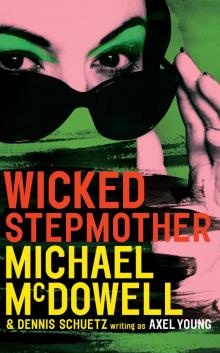 Wicked Stepmother
Wicked Stepmother Blackwater: The Complete Caskey Family Saga
Blackwater: The Complete Caskey Family Saga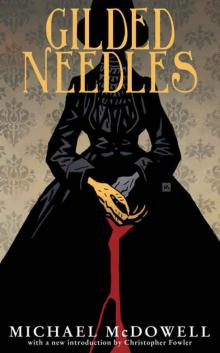 Gilded Needles (Valancourt 20th Century Classics)
Gilded Needles (Valancourt 20th Century Classics)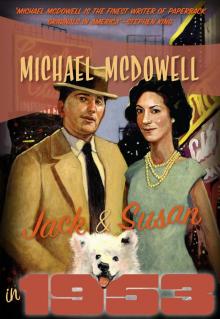 Jack and Susan in 1953
Jack and Susan in 1953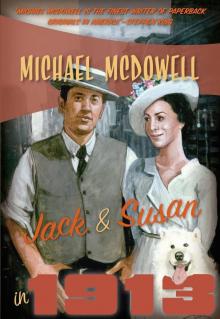 Jack and Susan in 1913
Jack and Susan in 1913 Rain
Rain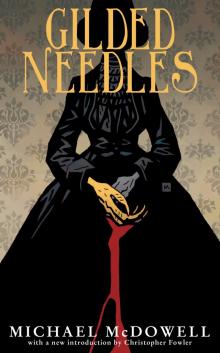 Gilded Needles
Gilded Needles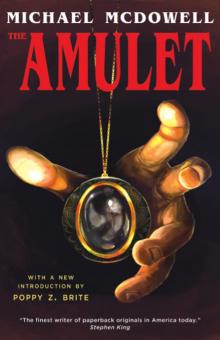 The Amulet
The Amulet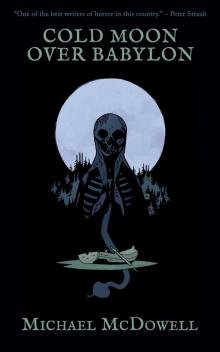 Cold moon over Babylon
Cold moon over Babylon The Elementals
The Elementals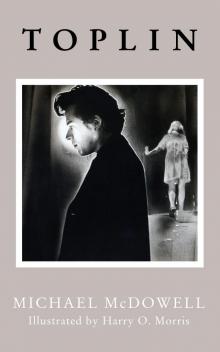 Toplin
Toplin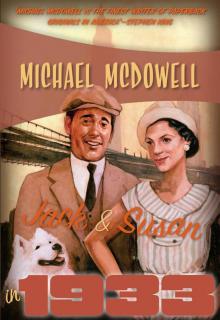 Jack and Susan in 1933
Jack and Susan in 1933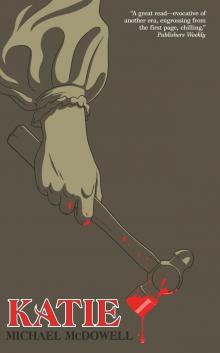 Katie
Katie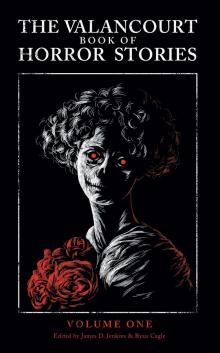 The Valancourt Book of Horror Stories
The Valancourt Book of Horror Stories